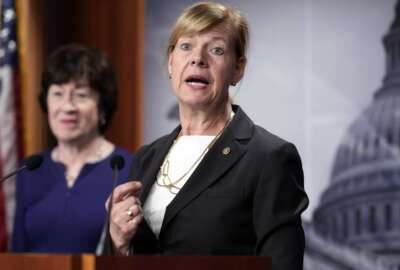The Morning Federal Newscast is a daily compilation of the stories you hear Federal Drive hosts Tom Temin and Amy Morris discuss throughout the show each day. The Newscast is designed to give FederalNewsRadio.com users more information about the stories you hear on the air.
- Lawmakers plan to tinker with the Homeland Security Department. The Senate Homeland Security and Governmental Affairs Committee yesterday marked up the DHS authorization bill, which would eliminate and consolidate some DHS offices and order improvements to acquisition, technology and personnel management. Committee Chairman Joe Lieberman (I-Conn.) said some offices that were authorized years ago never materialized, while others haven’t worked out properly. DHS already has an acquisition review board, but the authorization bill would legally require it. (Federal News Radio)
- The FAA is facing another shutdown, after all. It looked avoidable after a stopgap transportation bill passed the House on Tuesday. But Senate rules don’t allow lawmakers to shift from the bill they’re currently working on — a disaster aid bill — to the FAA bill, without the consent of all lawmakers. And one senator is holding out: Tom Coburn (R-Okla.) has refused to give his consent. He said he wants to change part of the bill that funds bike and walking paths. (Federal News Radio)
- Meanwhile, even though the provision was stripped from an earlier version, furloughed FAA workers might still get back pay, Gov Exec reports. Rep. Frank LoBiondo (R-N.J.) said he will continue to push the bipartisan legislation to provide backpay for the 4,000 FAA workers furloughed at the end of July.The House has already passed a bill that would extend the FAA’s funding through January, but a provision authorizing back pay remains stuck in committee. (GovExec)
- The Defense Department is top heavy, and Congress wants to cut the ranks of generals and admirals. Sen. Jim Webb (D-Va.), chairman of the Senate Armed Services Committee’s personnel subcommittee, said it’s time to fix what he called brass creep. He said the ratio of flag officers to the rest of the uniformed personnel is higher than at the end of World War II. Former Defense Secretary Robert Gates recently cut 100 flag positions, but Webb and others think there’s more room to cut. The Project on Government Oversight studied the issue and found that Navy admirals nearly outnumber the service’s ships. (Federal News Radio)
- Federal agency heads trudged to the White House in a confessional of cost-savings, telling Vice President Joe Biden the progress they’ve made carrying out an executive order to cut waste, fraud and abuse. Biden will issue a report detailing the savings, but administration officials gave out a few clues yesterday. The Centers for Medicare and Medicaid Services will require state governments to use recovery audits to bring back $2.1 billion in improper Medicaid payments. The Labor Department has handed out $191 million in grants to help states cut unemployment benefits fraud. Homeland Security estimates it saved $1 billion dollars over two years, in part by holding meetings in its own offices instead of renting private venues. (Federal News Radio)
- Federal agencies with budgets of at least $100 million are required to participate in the Small Business Innovation Research program. The program is designed — in part — to encourage participation by disadvantaged and women-owned businesses. The Government Accountability Office recently reviewed Defense, Energy, NASA, the National Institutes of Health and the National Science Foundation over a four-year period to see if the plan is working. Reviewers found that the agencies are participating in the SBIR program in a variety of ways but that there’s not enough data to evaluate the program’s impact. GAO wants SBA to work with those agencies to collect data that can tell if SBIR is actually working. (GAO)
- The Food and Drug Administration plans to overhaul how it responds to foodborne sickness episodes. FDA has formed what it calls the Coordinated Outbreak Response and Evaluation Network, or Core. The network will include teams of epidemiologists, veterinarians, microbiologists and other experts, who will work fulltime at FDA headquarters. Team members will share information with the Centers for Disease Control and Prevention, the Agriculture Department, and state and local agencies. The Core effort stems from the FDA Food Safety Modernization Act, which called for reforms in how the government responds to widespread foodborne illnesses. Dr. Kathleen Gensheimer, the state epidemiologist for Maine, joins FDA to head up the Core network. (FDA)
- Total dollars might be edging up, but the number of people contributing to the Combined Federal Campaign has been falling for years. Now an advisory committee is looking at ways to rev up participation in the 50-year-old annual charity drive, according to an Office of Personnel Management release. Over the last decade, the number of people who give has dropped by 400,000 and committee members suspect a bewildering array of 25,000 charities might be a turnoff. They also think publicity could be improved. Two former members of Congress chair the advisory committee — Tom Davis of Virginia and Beverly Byron of Maryland. The committee will report its findings next March. (GovExec)
Copyright
© 2024 Federal News Network. All rights reserved. This website is not intended for users located within the European Economic Area.




